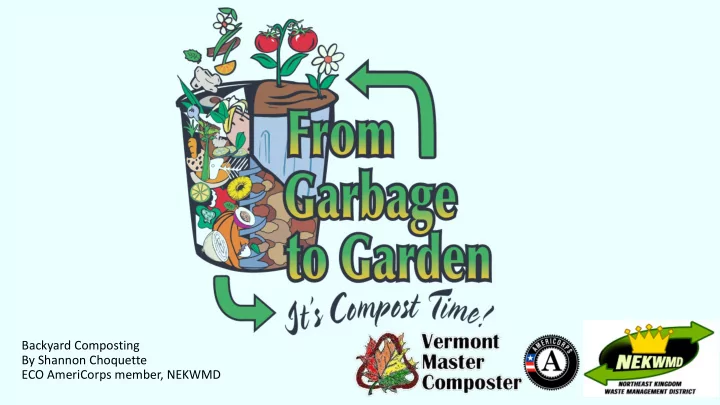

Backyard Composting By Shannon Choquette ECO AmeriCorps member, NEKWMD
What is composting? Dictionary.com: A mixture of decayed organic matter used to fertilize soil. All organic materials will go through the process of decomposition. When we manage this process to harvest nutrients for later use, its called composting.
VT’s Universal Recycling and Composting law Act 148
Today we will discuss how to: * choose the ideal set-up for your compost production, * build and maintain a productive compost pile, aka perfect your recipe, * troubleshoot problems that may arise.
Compost piles Share your stories… ➢ What type of compost system do you use? ➢ What materials do you compost? ➢ What methods do you use for maintenance?
Say “YES!” to these items: And “NO!” to these:
Composting Recipe cont. Aka - What’s the Deal with Carbon and Nitrogen? (and other points) Carbon : Nitrogen ratio – Carbon Nitrogen Ideal is 30 : 1 is the building block is necessary for of all cells, including building proteins and Approx. 2 parts green bacterial cells. enzymes. material (N) : 1 part brown material (C) by volume . Particle size of ingredients can Moisture levels should be that of help or hinder air flow. a wrong-out sponge, 50-60%.
Why the compost recipe matters: Decomposers do all the work! Worms Fungi Actinomycetes Bacteria Active only in cool compost Fungi breaks down Bacteria creates visible grey Different types depending on systems, promote aeration of woody materials. temp of compost pile stands in compost, produces pile. sweet smell. (thermophilic or mesophilic) Important component of Worm castings add nutrients final stages of compost. If pile becomes anaerobic, Vital component of cool to pile. compost systems, produce bacteria produce methane . antibiotics.
Hot vs. Cool Compost The microorganisms present in your pile depends on it’s temperature, and its temperature is based on the pile’s size. Cold Compost Hot Compost *Small Pile Size* *Larger Pile Size* (At least 1m 3 ) *Does not get hot enough to speed *Accepts Meat, Bones, Dairy* decomposition of Meat, Bones, Dairy* *Must turn pile often* *Less Maintenance Required* *Fast Process – Creates Compost *Slower Process – Creates Compost in in only 6 mo.* 1 year.*
Dispelling Common Myths Myth Fact Compost piles are hard to maintain and must be turned Turning your pile ensures fast decomposition, but there often. are other methods of adding air fresh air, like “lasagna” layering woody debris after food waste. I have to add water to my compost pile. Moisture from fruits&vegetables, coffee grounds, and other food scraps is often enough to maintain enough moisture. It is important to add “compost starter” to my pile. Compost starter is not necessary. Essential organisms like bacteria and worms will find their way to your pile from the surrounding environment. Compost piles smell bad. Composts smell bad when your recipe is missing something. Is there too much water? Too little brown material? Balancing your recipe will stop any smell! Amendments must be added to pile to enrich it with Nutrients from decomposing organic matter are all your nutrients. compost pile needs to be a valuable soil amendment!
Recommend
More recommend